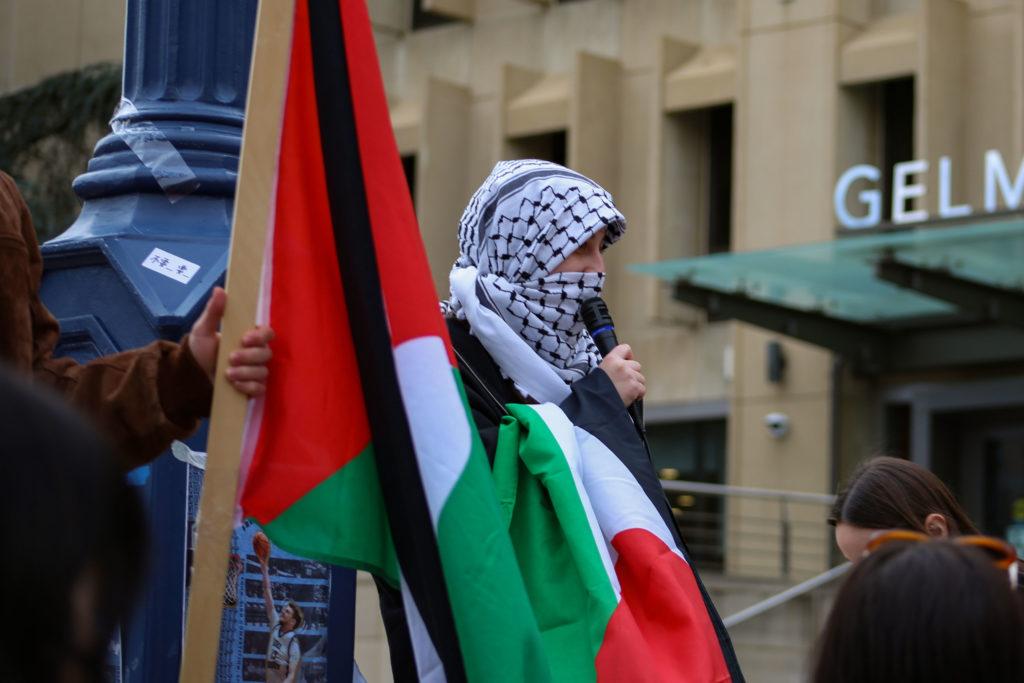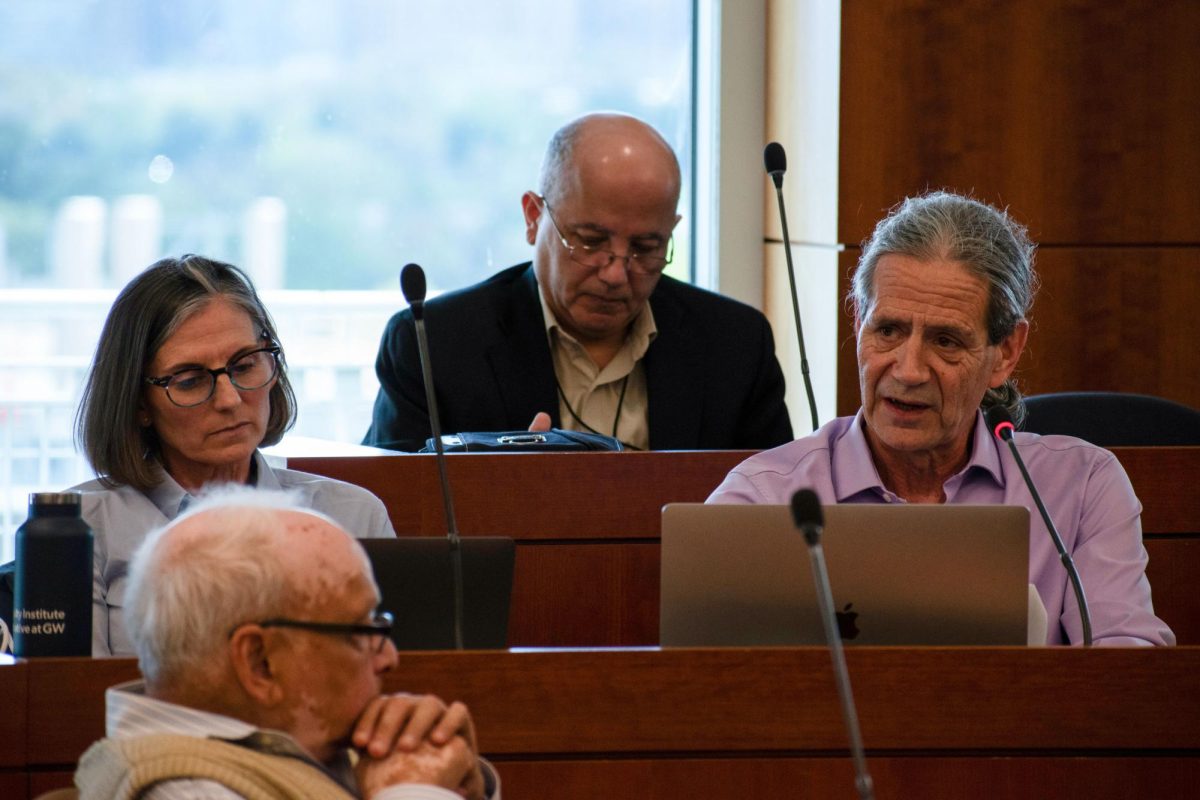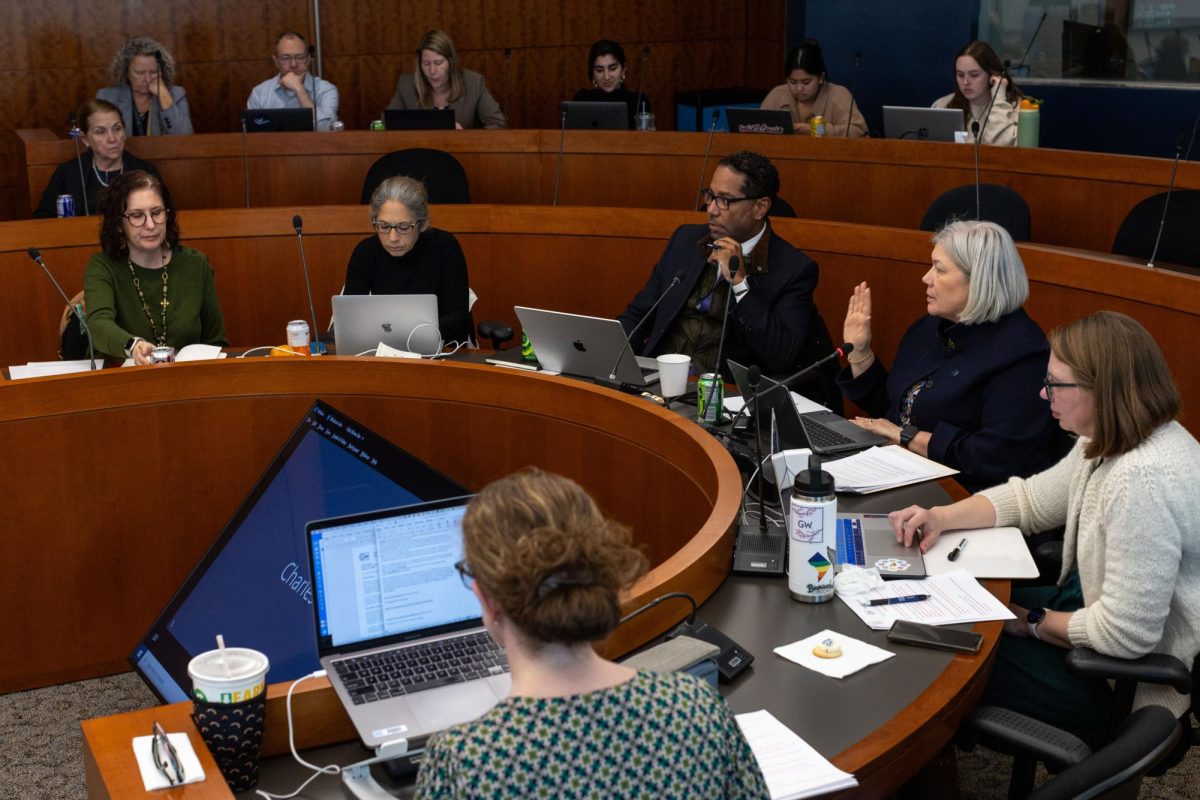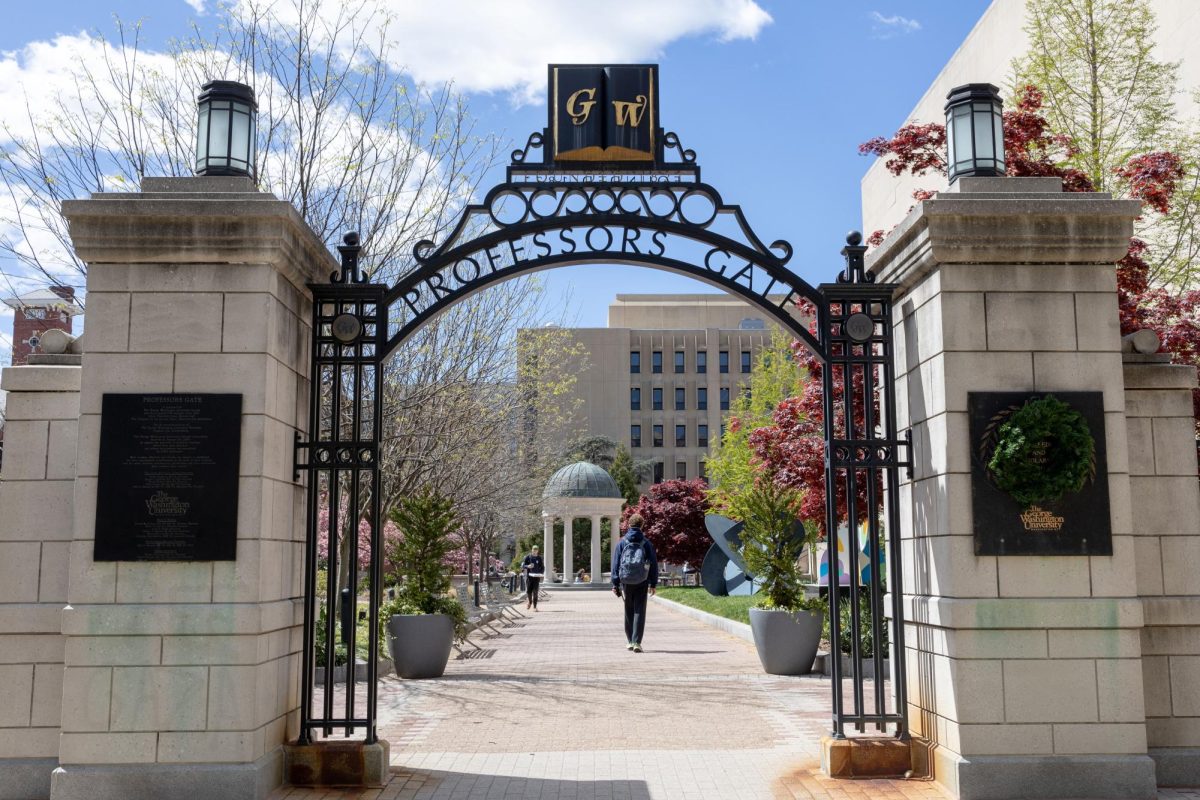A federal civil rights complaint filed against GW Tuesday is calling on the Department of Education to investigate years of “unabated” racism against Palestinian students on campus, according to a release issued by a Palestinian rights advocacy organization Wednesday.
The release states Palestine Legal filed the Title VI complaint with the department’s Office of Civil Rights to investigate the “years-long, hostile environment of anti-Palestinian racism” at GW, marked by three instances of alleged racism that have sparked heated debate and protest on campus within the past two years. The release alleges the racist treatment occurred when administrators and trustees denied Palestinian students access to mental health services in 2021, GW Hillel wrongfully accused the president of Students for Justine in Palestine of a conduct violation this past fall and students made anti-Palestinian comments in a class that same semester.
Palestine Legal is representing three students who allege they were the target of anti-Palestinian discrimination, according to the release. Radhika Sainath, a senior staff attorney for Palestine Legal, declined to release a copy of the complaint, saying Palestine Legal wanted to protect the students from “backlash and retaliation” from pro-Israel groups.
“There is simply no justification for GW’s racist, bigoted treatment of Palestinians,” Sainath said in the release. “Even if pro-Israel groups don’t like it and complain, the law is clear, Palestinian students are entitled to the same education and services as other students.”
Sainath said in an email that the organization hopes the University will issue a public apology acknowledging officials denied support services for Palestinian students and targeted Palestinian groups in disciplinary proceedings. She said the organization is demanding officials work with GW’s Office of Advocacy and Support to provide Palestinian students support for violence- and discrimination-related trauma.
“So deep is the anti-Palestinian prejudice, that GW even prohibited the provision of mental health services to Palestinian students like our client, who had suffered trauma,” Sainath said in an email. “Even if providing such services to Palestinian students and supporting Palestinian human rights spark complaints from anti-Palestinian groups, the law does not allow GW to discriminate on the basis of national origin or ethnicity with regards to campus services.”
Sainath said Palestine Legal is urging the University against adopting the International Holocaust Remembrance Alliance’s definition of antisemitism, which she said could facilitate anti-Palestinian discrimination on campus and prohibit individuals from criticizing the Israeli government.
More than 1,000 people signed a petition by the non-profit Combat Antisemitism Movement calling on the University to adopt the definition in November 2021 after a Torah scroll was vandalized in Tau Kappa Epsilon’s on-campus house. Supporters of the IHRA definition said it would standardize the process for university leaders to recognize and respond to acts of antisemitism on campus.
Sainath said the definition would be an “authoritative” tool to combat antisemitism on campus.
“The IHRA definition would require universities to punish faculty whose research suggests the Israeli state has engaged in racist practices – while allowing research that makes the same critique of the U.S. or other governments,” Sainath said.
University spokesperson Julia Metjian said officials have not seen Palestine Legal’s complaint. Metjian declined to say how officials will respond to the new complaint.
“The George Washington University strongly condemns hatred, discrimination and bias in all forms, and we are committed to fostering an environment in which the entire community feels safe and free of harassment, hostility or marginalization,” Metjian said in an email.
A Department of Education spokesperson declined to comment.
The recent filing is Palestine Legal’s second complaint against the University in the last two years.
The organization filed a complaint with the D.C. Office of Human Rights in November 2021, alleging the Board of Trustees and the Office of the President called an emergency meeting in June to direct the Office of Advocacy and Support to take down an Instagram post about a virtual healing space for Palestinian students in the wake of widespread violence in Gaza.
Palestine Legal represented Students for Justice in Palestine roughly a year later when the student organization and its sophomore president Lance Lokas were facing disciplinary charges from the University for “misconduct related to property.” SJP led a postering campaign outside of the GW Hillel building in October to protest a GW Hillel speaker event featuring Doron Tenne, a former Israeli Defense Forces intelligence officer.
The posters read messages like “Decolonize Palestine,” “Zionists F*** Off” and “War criminals GTFO.” GW Hillel Director Adena Kirstein said they caused between $1,200 and $4,500 in damage to benches outside of the building.
The Office of Student Rights and Responsibilities cleared SJP and Lokas of the charges later that month. An SRR investigation concluded that Lokas instructed all participants of the protest before the event to hang the posters exclusively on public property while following guidelines and laws surrounding wheatpasting, a process of hanging posters with a mixture of starch and water.
The complaint filed last week states the University subjected SJP to a “months-long disciplinary process” related to the accusations of vandalism outside of the Hillel building, even though a “white, Jewish” student already admitted to the postering damage, according to the release. Palestine Legal said in a December release that members of Jewish Voice for Peace publicly took credit for the postering weeks before the disciplinary hearing.
An Instagram post from SJP Wednesday states members stand in “full support” of the complaint, and their members have experienced discrimination congruent with its allegations.
“GW has proven time and time again that it will continue to align itself with the Zionist lobby, choosing the interests of right-wing, pro-Israel organizations over the safety and protection of its Palestinian and Arab community members,” they said.
GW Hillel declined to comment.
Palestine Legal also responded to a separate Title VI complaint that pro-Israel non-profit StandWithUs filed against GW last month, which alleged that Lara Sheehi, an assistant professor of clinical psychology, was antisemitic toward and “retaliated” against Jewish and Israeli students in a Professional Psychology Program course last semester. Palestine Legal’s release states officials did not properly address alleged anti-Palestinian comments students made during the class.
StandWithUs’ complaint states officials allegedly brought “disciplinary proceedings” against the Jewish students who raised concerns about an optional guest presentation from Nadera Shalhoub-Kevorkian, the chair of law at the Hebrew University of Jerusalem, as well as Sheehi’s class discussions and readings. The complaint alleges Shalhoub-Kevorkian and the class discussions and readings portrayed Israel and Jewish people in a negative light.
Palestine Legal’s complaint filed last week alleges that students in Sheehi’s course made “numerous anti-Palestinian comments” during the class that followed Shalhoub-Kevorkian’s presentation, according to the release.
Sheehi spoke out against StandWithUs’ complaint in an article published in the left-leaning magazine CounterPunch earlier this month, contesting that the allegations promoted “racist, anti-Arab and anti-Palestinian tropes” to disparage her. She said she has received racist messages and death threats, and her personal information has been leaked online since StandWithUs filed the complaint.
Sheehi said students who raised concerns with Shalhoub-Kevorkian’s presentation engaged in “racist rhetoric” about Shalhoub-Kevorkian in the class session that followed her presentation, suggesting she was a “terrorist” who advocated for violence against Jewish people.
Administrators reportedly asked one of the students involved in filing Palestine Legal’s complaint to attend a “restorative circle” with students in the class who allegedly made anti-Palestinian statements, like that Palestinians whom the Israeli army have killed are “terrorists,” according to a Jewish Currents article.
A Palestine Legal spokesperson told Jewish Currents the University hired two “external facilitators” responsible for discussing the situation with students who were involved, who then allegedly told the students to “think about the harm” they had caused.











